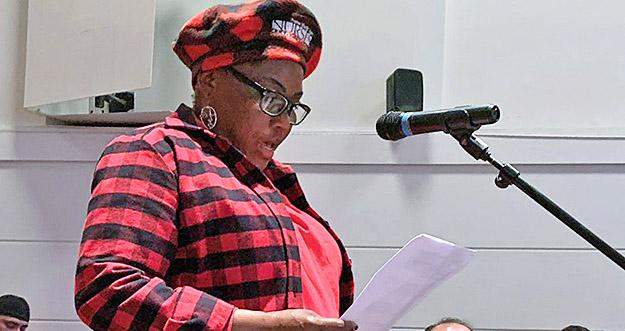NYSNA Member Testifies at New York’s Climate Action Council Bronx CLCPA Scoping Plan Hearing

As nurses on the front lines of patient care, we have seen up close the horrors of the COVID-19 pandemic. Over 40,000 people in New York City have died, and countless others have been left wounded, physically and emotionally. We have seen the deep impact the pandemic has had on low-income communities of color. The disparities are all-encompassing, affecting marginalized communities physically, mentally and economically. We know that this is just a preview of what is ahead if we do not take climate change seriously. It is critical that we heed the warning.
We have already seen the destruction that climate change and environmental degradation have had on our patients’ health. Increases in heat have contributed to an increase in hypertension. Pollutants are being discharged into our city air, causing a steady increase in chronic asthma conditions in our most vulnerable communities. In addition, those communities also face environmental injustices like contaminated water supplies and tainted soil. They are also the ones hardest hit by catastrophic events such as Superstorm Sandy. That is not OK.
The Bronx has the highest child asthma rates in New York City. In fact, emergency departments in Hunts Point and Longwood are double the citywide rates. When discussing environmental racism, it is important to point out that there are 16 school bus depots in the Bronx — three in Hunts Point alone. There is a direct correlation between high asthma rates within these environmental justice communities and the high prevalence of bus depots. Disturbingly, 75% of the MTA-operated departments across the five boroughs are in communities where most residents are people of color.
The South Bronx also houses the Hunts Point Food Distribution Center, which is the second-largest food distribution center in the world. Overall, the Hunts Point community experiences 20,000 diesel truck trips into and out of the neighborhood each week. It is not uncommon for those trucks to lay over for eight to 12 hours while waiting for goods or to comply with the U.S. Department of Transportation rest period requirements. They are emitting exhaust that compromises the surrounding community’s health.
Let me be clear: The NYSNA is 100% in support of a fossil fuel-free economy. We should be doing everything possible to make that a reality. We also need to ensure we are doing that in an equitable way. That includes giving special attention to the fact that we must prioritize environmental justice communities. Additionally, workers must be transitioned into good, green jobs.
As a strong labor union that believes in fairness and equity, NYSNA will always advocate for workers to be treated with dignity and respect. Unfortunately, the Scoping Plan does not adequately address how to support displaced workers. The Climate Action Council must recommend creation of a Worker and Community Assurance Fund. That would provide support to fossil fuel-dependent workers as well as to communities who rely on fossil fuel-dependent industries. It would include wage replacement, pension support and expanded funding for communities that will be taking a huge hit. Stronger, detailed language must be used along with policies outlined to address labor standards. This is not an area that we can leave open and vague.
We also want to see the Scoping Plan advance Buy NY and Best Value Procurement policies to leverage the state’s purchasing and contracting power. That would be used to incentivize the creation of green jobs and prioritize local hiring and job access for traditionally excluded populations. The state should provide direct funding for training, workforce development, apprenticeship and pre-apprenticeship programs across sectors. We ultimately want workers to be able to advocate for their health and safety and have good benefits such as affordable healthcare.
Ultimately, we need adequate funding for the Climate Leadership and Community Protection Act. We must figure out how to get a good funding mechanism is place so that we can fully do the work that the act prescribes. The health of our family, friends and neighbors can ill-afford anything less.
Flandersia Jones, RN, MPH, serves as director at large for NYSNA. She works at BronxCare Health System.